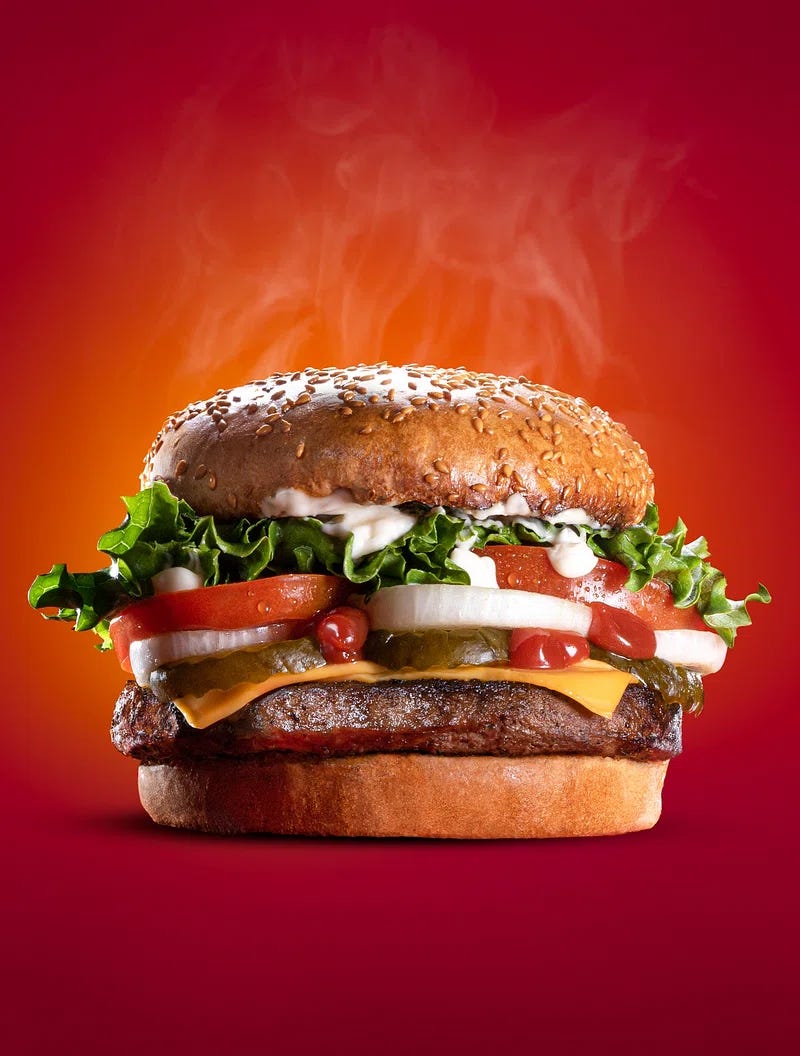Being overweight is a life-long struggle for me and countless others around the world. In this essay I want to outline why it’s so difficult to succeed in this battle against the extra kilos. You won’t find any weight-loss tips here, but a description of how the deck is stacked against the average consumer.
Those living in affluent countries experience an era of hyper-abundant food. Supermarkets are stocked with a dizzying array of options. Yet, our genetic and behavioral programming, honed over millennia in our ancestral environment, compels us to crave sugar, fat, and salt—nutrients that were once scarce and essential for survival. This mismatch between our past and our present reality creates a significant challenge: we must consciously override our intuitions to make healthy choices. It's a battle of deliberate thought over intuition.
The Ancestral Environment vs. Modern Abundance
Our ancestors evolved in environments where food was often scarce. The ability to quickly identify and consume high-calorie foods was a survival advantage. Today, these same instincts work against us. In a world where calorie-dense foods are readily available, our natural cravings can lead to overconsumption and poor health outcomes. Overeating is essential to prepare for times of famine, but those are now almost non-existent in wealthy countries. Being slim and healthy has become a status symbol because it goes against the grain of our environment, requiring a level of knowledge, discipline and awareness that is almost unnatural.
The Role of “big food”
Food companies are well aware of our nutritional weaknesses. They systematically exploit these vulnerabilities to maximize profits, creating products that are high in sugar, fat, and salt—ingredients that trigger our reward centers and keep us coming back for more. Making the most enticing food is an existential quest for them. Fast food, processed snacks, and sugary drinks are engineered to be irresistible, making it hard for individuals to make healthy choices. The highly competitive nature of the food industry pushes these corporations towards ever more innovative approaches of catering to our pre-modern minds.
The Supermarket Dilemma
Walk into any typical supermarket and you'll find that around 80% of the products on offer cannot be considered healthy. I sometimes imagine what a store would look like if all of those items were removed. Shelves are lined with processed foods, sugary cereals, alcoholic beverages and snacks that offer little nutritional value. These items are often strategically placed at eye level or in prominent displays to entice shoppers. Navigating this environment requires a deliberate effort to seek out healthier options, which are often less visible and less convenient. Consumers are thrown into a maze lined with temptations. If you complete a visit to one of those markets without having given in to some of the numerous indulgences they offer, you have exerted plenty of willpower.
The Power Of Advertising
Advertisements play a significant role in shaping our food choices. They are designed to tap into our deepest desires and structural weaknesses, making unhealthy foods seem all the more appealing. Marketing campaigns often target children, creating lifelong habits that are difficult to break. Undoing foundations that have been laid so early in a life is a long and difficult endeavour. The advertisements we are bombarded with are deliberate exploitations of our vulnerabilities; a special-forces operation against our minds and self-interest. How can we as individuals defend ourselves against a highly motivated set of adversaries that thrive on catching us off guard?
The Sedentary Lifestyle
In addition to the challenges posed by our food environment, many of us lead sedentary lifestyles. Unlike our ancestors, who had to exert significant physical effort to obtain food, we can acquire calories with minimal effort. Those who work in office jobs typically don’t have to move to fulfill their tasks. This lack of movement compounds the problem, as we must now engage in exercise to maintain a healthy weight and overall well-being. Take the energy contained in the food we ingest and burn them in activities that don’t have any purpose in themselves: running in a circle or lifting heavy objects. We do those things because exercise improves health, happiness and self-confidence, they are necessary to achieve balance.
The Impact of Stress & Lack of Sleep
Stress and lack of sleep are factors that further complicate our ability to make healthy choices. Chronic stress and sleep deprivation can lead to increased levels of cortisol, a hormone that can stimulate appetite and lead to cravings for high-calorie foods. Additionally, when we are tired or stressed, our willpower is often at its lowest, making it even harder to resist the numerous unhealthy offerings that surround us. The omnipresent temptations are particularly overwhelming. After a long, difficult day at work, it is tough to resist our instincts.
The Absurdity Of Maximial “Calorie Burning”
In a world where efficiency is prized in so many areas—from large machines (chemical plants, planes) to organizational structures—it is somewhat absurd that we often focus on "burning calories" as a means to maintain a healthy weight. To fight against the impact of calorie dense-foods in combination with a sedentary lifestyle, we have to find ways to physically exert ourselves with the sole purpose of burning off excess energy without any functional purpose in mind.
Genetic Engineering: Adapting Humans to the Modern Environment
I doubt that supermarkets and fast-food restaurants are going to change meaningfully for the better. The challenge will remain the same for each person, so we have to adapt in other ways. Sure, we can call for government regulation or assume that companies will cater to changed consumers’ buying behavior, but I am pessimistic about large-scale, structural change - I believe the behaviors we can observe today will stay in place. As more and more people join the global middle class, I believe people will be lifted from poverty into obesity at a rapid clip.
One approach to address the mismatch between homo sapiens’ architecture and the environment we find ourselves in is through genetic engineering of humans. Natural adaptation is too slow to compete with the pace of civilizational change. Imagine if we could modify our genetic makeup to reduce our cravings or enhance our metabolic efficiency to better process the foods we consume. By adapting our bodies to the food-abundant environment, we could make healthy living more intuitive and less of a battle against our instincts. Carrots could be as attractive as chocolate while a fatty burger could be as bland as celery. The genetic modification could involve altering our taste receptors to find healthier foods more appealing, thereby ending the struggle of intuition vs. spirit.
Conclusion
Living in a world of hyper-abundant food presents unique challenges for individuals and society at large. By understanding how our ancestral environment has shaped our own genes and behaviors, we can appreciate the influences of the modern food industry and how fundamentally mal-adapted we are to the environment we find ourselves in. It requires willpower, knowledge, good habits and deliberate thought, but the rewards—a healthier and longer life—are well worth it. Being slim and healthy in today's world is a testament to our ability to overcome our instincts and consistently make deliberate, informed choices. Mind over body. Conscious thought over primal intuition. Advancements in genetic engineering hold promise for adapting humans to better suit our modern environment, making healthy living more intuitive and less of a struggle.







